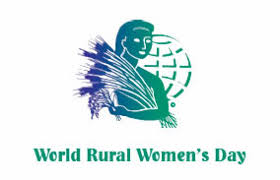Editorial
In Honor of Rural Women

This Saturday, October 15, the world will recognize, as it does every year, the importance of the contributions of rural women and girls, including indigenous women, who live and work in remote and rural, often poverty-stricken, communities of the world. These strong women and girls play a key role in enhancing agricultural development, managing natural resources, adopting climate-resilient agricultural approaches, and planning against malnutrition and food insecurity.
The International Day of Rural Women was officially proclaimed by a resolution adopted by the United Nations in December 2007. The day celebrates and honors the role, often stereotyped but extremely substantial, of rural women who continue to face historic discrimination in many areas, including land and livestock ownership, equal pay, participation in meaningful decision-making, and access to resources such as credit and markets. This U.N. proclamation was the outgrowth of the Fourth World Conference on Women, held in Beijing, China, 12 years previously, wherein the idea of celebrating and supporting women was put forth. The date, October 15, was determined because, since 1945, World Food Day has been celebrated on October 16 and it seemed entirely relevant to honor rural women for their contributions to agriculture, food production, and food safety around the same time.
Rural women and girls are essential both inside and outside of their households. They undertake a wide range of tasks and are involved with far-reaching decisions that ensure the sustainability of rural households and communities and improve those communities’ livelihoods and wellbeing. However, although these women account for upwards of 40 percent of the agricultural labor force in developing countries, fewer than 15 percent of them are landholders worldwide. And worse, very often they are not paid, and certainly not paid equally, for their work.
While some progress has been made in many parts of the world, particularly in developed nations, it has most often been made by women, or groups of women, on their own who, with the limited help of micro-grants and financing, establish small businesses or cooperatives providing services for their communities or commodities that can be sold to the wider world. But progress is rare—even in most developed countries, the rate of male entrepreneurs is generally 50-100 percent higher than that of female entrepreneurs. Panama has the most female entrepreneurs of all developed countries, but at just 29.1 percent, not necessarily something to brag about.
The International Day of Rural Women formally celebrates and honors the role of rural women and girls, recognizing their importance in enhancing agricultural and rural development worldwide. Without their empowerment, economically as well as socially, their families, communities, and countries cannot reach their true capacity for poverty reduction, sustainable development, and food and nutrition security, nor would the younger generation of girls be able to lead and support any changes when they become necessary. In the end, the formal designation is nice, but it’s our own support of female entrepreneurs, both locally and globally, that will ultimately make the critical difference in enhancing and strengthening rural life around the globe.

